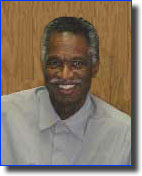CITIZEN'S CALENDAR --
Howard Fuller on School Choice
Posted by Craig Westover | 8:49 PM |

Dr. Howard Fuller
What -- Howard Fuller speaks for school choice
When -- Tuesday December 7th 11:30-1:00
Where -- Jerome Hill Theater 180 East 5th Street, Downtown St. Paul
For more information, and to reserve a box lunch catered by the Minnesota Business Academy’s Enterprise-based Learning Program, call 651-293-9044 or 651.265.2795
Sponsored by the Partnership for Choice in Education, the St. Paul Chamber of Commerce and the Citizens League.
One might introduce Howard Fuller by the position‘s he‘s held . . .
- Distinguished Professor of Education and Founder/Director of the Institute for the Transformation of Learning at Marquette University in Milwaukee, Wisconsin.
- Superintendent of Milwaukee Public Schools, June 1991- June 1995.
- Director of the Milwaukee County Department of Health and Human Services, 1988-91;
- Dean of General Education at the Milwaukee Area Technical College, 1986-1988;
Secretary of the Wisconsin Department of Employment Relations, 1983-1986;
- Associate Director of the Educational Opportunity Program at Marquette University, 1979-1983. He was also a Senior Fellow with the Annenberg Institute for School Reform at Brown University, 1995-1997.
- Dr. Fuller received his B.S. degree in Sociology from Carroll College in Waukesha, Wisconsin in 1962; M.S.A degree in Social Administration from Western Reserve University in Cleveland, Ohio in 1964, and his Ph.D. in Sociological Foundations of Education from Marquette University, Milwaukee, Wisconsin in 1986.
- Three Honorary Doctorate Degrees: Doctorate of Humane Letters from Carroll College in 1987; Doctorate of Laws from Marian College, Fond Du Lac, Wisconsin in 1992; Doctorate of Business and Economics from Milwaukee School of Engineering in 1995.
- He serves on the Board of Directors Transcenter for Youth; the Crusade to Save Our Children; the Johnson Foundation; the Dorothy Danforth Compton Fellowship Program and is an active member of several other community and national organizations.
"[People]do not make a distinction between public education, which is a concept, and the system that delivers public education. The system that delivers public education, as we’ve structured it in America, is not public education. Public education is a concept that that it is in our interest to educate all our children. What makes public education public is that it serves the public’s interests. . . . . What we therefore need to do is to commit to a purpose, not institutional arrangements.In these two paragraphs, Fuller nails the problem with public education today. Sol Stern, in a previous Educational Speaker Series presentation attributed the general public’s acceptance of the educational establishment’s opposition to school choice to the “education mystique.” There is reverence for public education, a belief that it is so important that we shouldn’t tamper with it, the hope that with just a little more money it will finally deliver on its promise, which blinds us to the reality of the homogenized mess that what passes for public education has become.
“We have to ask why people do not want low-income parents to have choice. The hypocrisy on this point is phenomenal. We have teachers teaching in schools that they would never put their own children in and then demanding that somebody else’s children stay there. We have public school teachers putting their own children in private schools. We have leaders in Congress pontificating against choice who have their own children in private schools. The argument always comes down to ‘If we let these poor parents out, it will destroy the system.” I have a question: Is it about the system, or is it about the parents and the children?”
Regardless of race or ethnicity, whether a parent of a k-12 student in public or private school, a non-parent, a former parent of a K-12 student, or a homeschooler, you have a stake in the education for all children. Real public education is essential for preservation of our democracy. Education is a public good, worthy of tax dollar support, but also by necessity, accountable -- not to those who ostensibly run the system, but to all those taxpayers who support the system. School choice is the mechanism to hold the system accountable.
School choice has been called by many the last civil rights initiative left to face. When he speaks of school choice, Fuller’s words reverberate with the ringing rhetoric of that era.
“I understand that our position [school choice] is controversial. But social change is always controversial. It transfers power to people who have never had it and takes power from those who have had it. How can that not be controversial? But you know what? We think it is the right thing to do, and we are willing to fight forever on this point. We understand that the race goes, not to the swift, but to those who can endure until the end. We intend to endure to the end.”Amen.

<< Home